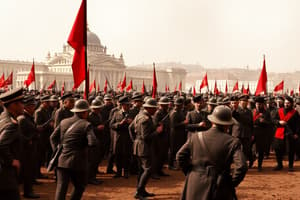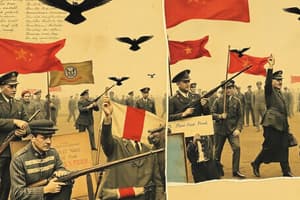Podcast
Questions and Answers
Where are the Balkans and why are they referred to as the powder keg of Europe?
Where are the Balkans and why are they referred to as the powder keg of Europe?
The Balkans are in Southeast Europe. They were referred to as the powder keg of Europe because tensions and conflicts in the region contributed to the outbreak of WWI.
What are the MAIN causes of WWI?
What are the MAIN causes of WWI?
- Nationalism (correct)
- Alliances (correct)
- Imperialism (correct)
- Militarism (correct)
Describe how WWI began.
Describe how WWI began.
WWI began with the assassination of Archduke Franz Ferdinand, which led Austria-Hungary to declare war on Serbia, pulling in Russia as Serbia's ally.
Who was Franz Ferdinand and what happened to him?
Who was Franz Ferdinand and what happened to him?
What was the Black Hand?
What was the Black Hand?
Which countries were part of the Allied Powers?
Which countries were part of the Allied Powers?
Why did Britain have a powerful navy prior to WWI?
Why did Britain have a powerful navy prior to WWI?
What did nationalism look like prior to WWI?
What did nationalism look like prior to WWI?
What was the Schlieffen Plan?
What was the Schlieffen Plan?
Why does England join WWI?
Why does England join WWI?
What is going on with Italy at the start of the war?
What is going on with Italy at the start of the war?
Why does the Schlieffen Plan fail?
Why does the Schlieffen Plan fail?
What is the significance of the First Battle of the Marne?
What is the significance of the First Battle of the Marne?
What is a stalemate and how did it manifest on the Western Front?
What is a stalemate and how did it manifest on the Western Front?
Describe the new technology being used during WWI.
Describe the new technology being used during WWI.
What is involved in total war?
What is involved in total war?
What is a convoy and why are they used?
What is a convoy and why are they used?
Why are the British blockading Germany's ports?
Why are the British blockading Germany's ports?
Why does the Ottoman Empire join the war as a Central Power?
Why does the Ottoman Empire join the war as a Central Power?
How does fighting on the Eastern front differ from fighting on the Western front?
How does fighting on the Eastern front differ from fighting on the Western front?
Why are colonial subjects eager to join the war?
Why are colonial subjects eager to join the war?
Who are the ANZACs?
Who are the ANZACs?
What is the significance of the Battle of Gallipoli?
What is the significance of the Battle of Gallipoli?
What is the Zimmerman Note?
What is the Zimmerman Note?
What events caused or almost caused the U.S. to get involved in WWI?
What events caused or almost caused the U.S. to get involved in WWI?
What is unrestricted submarine warfare?
What is unrestricted submarine warfare?
What happens to the colonies in Africa, Asia, and the Pacific after WWI?
What happens to the colonies in Africa, Asia, and the Pacific after WWI?
What is the League of Nations?
What is the League of Nations?
Describe the Treaty of Versailles.
Describe the Treaty of Versailles.
What is the article of 231?
What is the article of 231?
What is France's goal for Germany post WWI?
What is France's goal for Germany post WWI?
What are mandates and what nations are they today?
What are mandates and what nations are they today?
Which problem threatened the peace in postwar Europe?
Which problem threatened the peace in postwar Europe?
What is the significance of November 11, 1918?
What is the significance of November 11, 1918?
Why were people living outside of Europe fighting in World War I?
Why were people living outside of Europe fighting in World War I?
Flashcards are hidden until you start studying
Study Notes
WWI Background and Causes
- The Balkans were referred to as the "powder keg of Europe," highlighting their role in igniting WWI.
- MAIN is an acronym representing the key causes of WWI: Militarism, Alliances, Imperialism, and Nationalism.
Outbreak of WWI
- Archduke Franz Ferdinand's assassination by Gavrilo Princip spurred Austria-Hungary to declare war on Serbia, leading to wider conflict.
- Austria-Hungary's ultimatum to Serbia marked a critical escalation in tensions.
Key Figures and Groups
- Franz Ferdinand was the heir to the Austro-Hungarian throne; his assassination in Sarajevo triggered the war.
- The Black Hand was a Serbian nationalist group responsible for Ferdinand's assassination.
Alliances and Powers
- The Allies included France, Britain, Russia, Italy, the US, Romania, and Serbia; the Central Powers consisted of Austria-Hungary, Germany, Bulgaria, and the Ottoman Empire.
- Britain's extensive naval power was essential for protecting its overseas empire before the war began.
Nationalism and Tensions
- Nationalism fueled conflict: Germany took pride in military strength, France sought revenge for past defeats, and Russia promoted Pan-Slavism.
- Serbia's aspirations were threatened by both the Ottoman Empire and Austria-Hungary.
Military Strategies
- The Schlieffen Plan aimed to prevent a two-front war by attacking France first, assuming Russia would mobilize slowly.
- The plan failed due to rapid Russian mobilization and strong Allied resistance at the First Battle of the Marne.
Warfare Dynamics
- The Western Front saw trench warfare, characterized by a stalemate where neither side could achieve decisive victory.
- New technologies: machine guns increased casualties, artillery devastated troops, poison gas was used for chemical warfare, and U-boats targeted shipping.
Total War Concept
- Total war involves mobilizing all national resources for war efforts, impacting civilian life and economies.
Naval Strategies
- Convoys, groups of merchant ships protected by warships, were essential for safeguarding supplies.
- Britain's blockade of Germany aimed to undermine German supplies and resources.
Involvement of the Ottoman Empire
- The Ottoman Empire joined the Central Powers through the Turco-German Alliance in 1914, entering the war following attacks on Russian ports.
Comparison of Fronts
- The Western Front was dominated by trench warfare, while the Eastern Front was larger and more fluid, lacking extensive trench systems.
Colonial Involvement
- Colonial subjects joined the war with hopes of gaining independence from imperial powers.
Key Battles and Events
- The Battle of Gallipoli aimed to open a supply line to Russia, but ended in withdrawal after six months.
- The Zimmerman Note proposed a German-Mexican alliance against the US, contributing to American entry into the war.
Aftermath and Peace Treaties
- Unrestricted submarine warfare by Germany led to tensions with neutral nations, particularly the US.
- The Treaty of Versailles imposed heavy reparations on Germany, limited its military, returned territories to France, and included the "war-guilt clause" (Article 231).
Post-War Europe
- Mandates were territories administered by Western powers, causing future conflicts in the Middle East.
- Overlapping territorial claims threatened postwar peace, leading to lasting disputes.
Conclusion of the War
- WWI officially ended on November 11, 1918.
- Many fighters hoped their service would result in respect and independence for their nations.
Studying That Suits You
Use AI to generate personalized quizzes and flashcards to suit your learning preferences.



